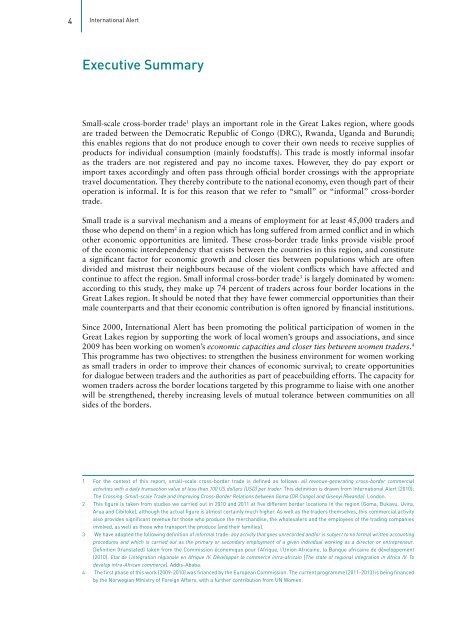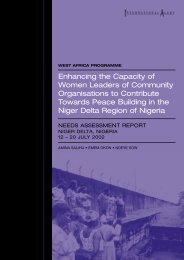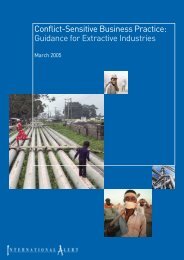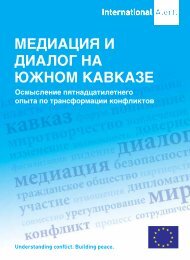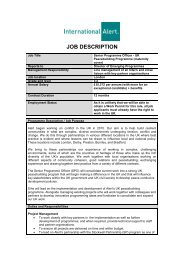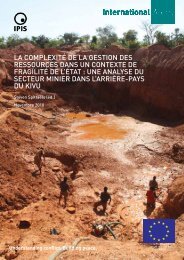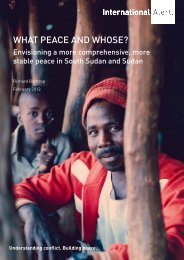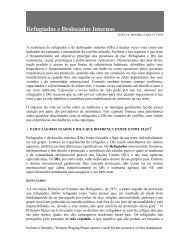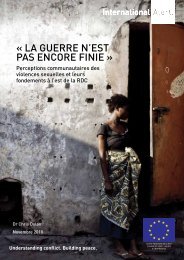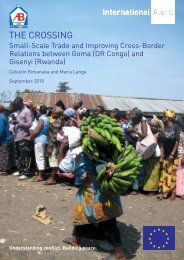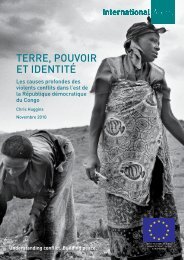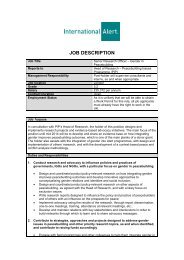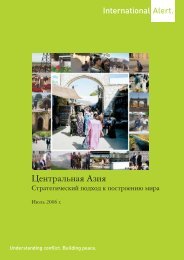Walking in the Dark: informal Cross-border trade ... - International Alert
Walking in the Dark: informal Cross-border trade ... - International Alert
Walking in the Dark: informal Cross-border trade ... - International Alert
You also want an ePaper? Increase the reach of your titles
YUMPU automatically turns print PDFs into web optimized ePapers that Google loves.
4 <strong>International</strong> <strong>Alert</strong><br />
Executive Summary<br />
Small-scale cross-<strong>border</strong> <strong>trade</strong> 1 plays an important role <strong>in</strong> <strong>the</strong> Great Lakes region, where goods<br />
are <strong>trade</strong>d between <strong>the</strong> Democratic Republic of Congo (DRC), Rwanda, Uganda and Burundi;<br />
this enables regions that do not produce enough to cover <strong>the</strong>ir own needs to receive supplies of<br />
products for <strong>in</strong>dividual consumption (ma<strong>in</strong>ly foodstuffs). This <strong>trade</strong> is mostly <strong>in</strong>formal <strong>in</strong>sofar<br />
as <strong>the</strong> <strong>trade</strong>rs are not registered and pay no <strong>in</strong>come taxes. However, <strong>the</strong>y do pay export or<br />
import taxes accord<strong>in</strong>gly and often pass through official <strong>border</strong> cross<strong>in</strong>gs with <strong>the</strong> appropriate<br />
travel documentation. They <strong>the</strong>reby contribute to <strong>the</strong> national economy, even though part of <strong>the</strong>ir<br />
operation is <strong>in</strong>formal. It is for this reason that we refer to “small” or “<strong>in</strong>formal” cross-<strong>border</strong><br />
<strong>trade</strong>.<br />
Small <strong>trade</strong> is a survival mechanism and a means of employment for at least 45,000 <strong>trade</strong>rs and<br />
those who depend on <strong>the</strong>m 2 <strong>in</strong> a region which has long suffered from armed conflict and <strong>in</strong> which<br />
o<strong>the</strong>r economic opportunities are limited. These cross-<strong>border</strong> <strong>trade</strong> l<strong>in</strong>ks provide visible proof<br />
of <strong>the</strong> economic <strong>in</strong>terdependency that exists between <strong>the</strong> countries <strong>in</strong> this region, and constitute<br />
a significant factor for economic growth and closer ties between populations which are often<br />
divided and mistrust <strong>the</strong>ir neighbours because of <strong>the</strong> violent conflicts which have affected and<br />
cont<strong>in</strong>ue to affect <strong>the</strong> region. Small <strong>in</strong>formal cross-<strong>border</strong> <strong>trade</strong> 3 is largely dom<strong>in</strong>ated by women:<br />
accord<strong>in</strong>g to this study, <strong>the</strong>y make up 74 percent of <strong>trade</strong>rs across four <strong>border</strong> locations <strong>in</strong> <strong>the</strong><br />
Great Lakes region. It should be noted that <strong>the</strong>y have fewer commercial opportunities than <strong>the</strong>ir<br />
male counterparts and that <strong>the</strong>ir economic contribution is often ignored by f<strong>in</strong>ancial <strong>in</strong>stitutions.<br />
S<strong>in</strong>ce 2000, <strong>International</strong> <strong>Alert</strong> has been promot<strong>in</strong>g <strong>the</strong> political participation of women <strong>in</strong> <strong>the</strong><br />
Great Lakes region by support<strong>in</strong>g <strong>the</strong> work of local women’s groups and associations, and s<strong>in</strong>ce<br />
2009 has been work<strong>in</strong>g on women’s economic capacities and closer ties between women <strong>trade</strong>rs. 4<br />
This programme has two objectives: to streng<strong>the</strong>n <strong>the</strong> bus<strong>in</strong>ess environment for women work<strong>in</strong>g<br />
as small <strong>trade</strong>rs <strong>in</strong> order to improve <strong>the</strong>ir chances of economic survival; to create opportunities<br />
for dialogue between <strong>trade</strong>rs and <strong>the</strong> authorities as part of peacebuild<strong>in</strong>g efforts. The capacity for<br />
women <strong>trade</strong>rs across <strong>the</strong> <strong>border</strong> locations targeted by this programme to liaise with one ano<strong>the</strong>r<br />
will be streng<strong>the</strong>ned, <strong>the</strong>reby <strong>in</strong>creas<strong>in</strong>g levels of mutual tolerance between communities on all<br />
sides of <strong>the</strong> <strong>border</strong>s.<br />
1 For <strong>the</strong> context of this report, small-scale cross-<strong>border</strong> <strong>trade</strong> is def<strong>in</strong>ed as follows: all revenue-generat<strong>in</strong>g cross-<strong>border</strong> commercial<br />
activities with a daily transaction value of less than 100 US dollars (USD) per <strong>trade</strong>r. This def<strong>in</strong>ition is drawn from <strong>International</strong> <strong>Alert</strong> (2010):<br />
The <strong>Cross</strong><strong>in</strong>g: Small-scale Trade and Improv<strong>in</strong>g <strong>Cross</strong>-Border Relations between Goma (DR Congo) and Gisenyi (Rwanda). London.<br />
2 This figure is taken from studies we carried out <strong>in</strong> 2010 and 2011 at five different <strong>border</strong> locations <strong>in</strong> <strong>the</strong> region (Goma, Bukavu, Uvira,<br />
Arua and Cibitoke), although <strong>the</strong> actual figure is almost certa<strong>in</strong>ly much higher. As well as <strong>the</strong> <strong>trade</strong>rs <strong>the</strong>mselves, this commercial activity<br />
also provides significant revenue for those who produce <strong>the</strong> merchandise, <strong>the</strong> wholesalers and <strong>the</strong> employees of <strong>the</strong> trad<strong>in</strong>g companies<br />
<strong>in</strong>volved, as well as those who transport <strong>the</strong> produce (and <strong>the</strong>ir families).<br />
3 We have adopted <strong>the</strong> follow<strong>in</strong>g def<strong>in</strong>ition of <strong>in</strong>formal <strong>trade</strong>: any activity that goes unrecorded and/or is subject to no formal written account<strong>in</strong>g<br />
procedures and which is carried out as <strong>the</strong> primary or secondary employment of a given <strong>in</strong>dividual work<strong>in</strong>g as a director or entrepreneur.<br />
Def<strong>in</strong>ition (translated) taken from <strong>the</strong> Commission économique pour l’Afrique, l’Union Africa<strong>in</strong>e, la Banque africa<strong>in</strong>e de développement<br />
(2010). Etat de l’<strong>in</strong>tégration régionale en Afrique IV. Développer le commerce <strong>in</strong>tra-africa<strong>in</strong> [The state of regional <strong>in</strong>tegration <strong>in</strong> Africa IV. To<br />
develop <strong>in</strong>tra-African commerce]. Addis-Ababa.<br />
4 The first phase of this work (2009-2010) was f<strong>in</strong>anced by <strong>the</strong> European Commission. The current programme (2011-2013) is be<strong>in</strong>g f<strong>in</strong>anced<br />
by <strong>the</strong> Norwegian M<strong>in</strong>istry of Foreign Affairs, with a fur<strong>the</strong>r contribution from UN Women.


